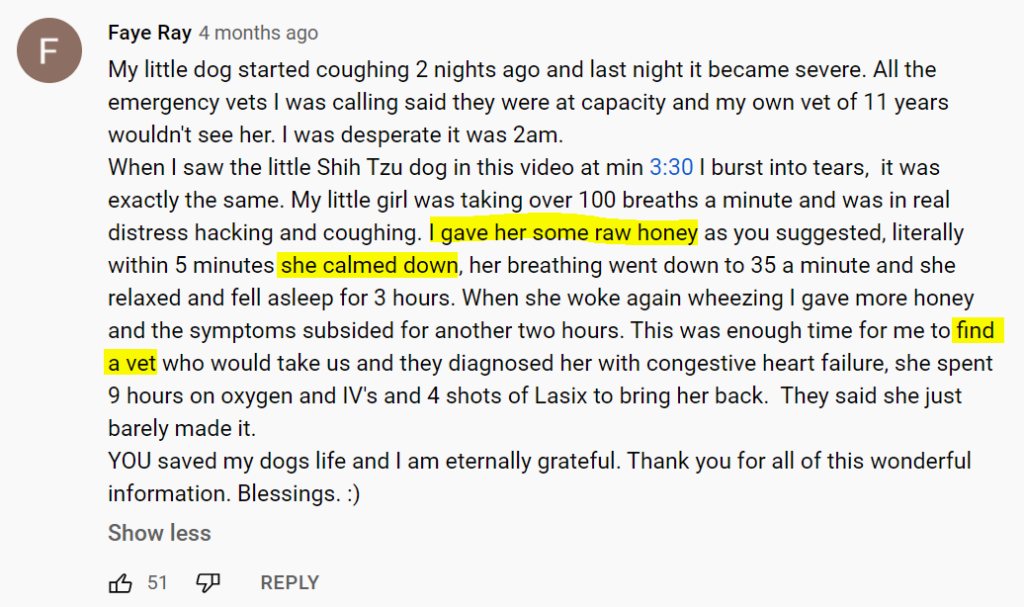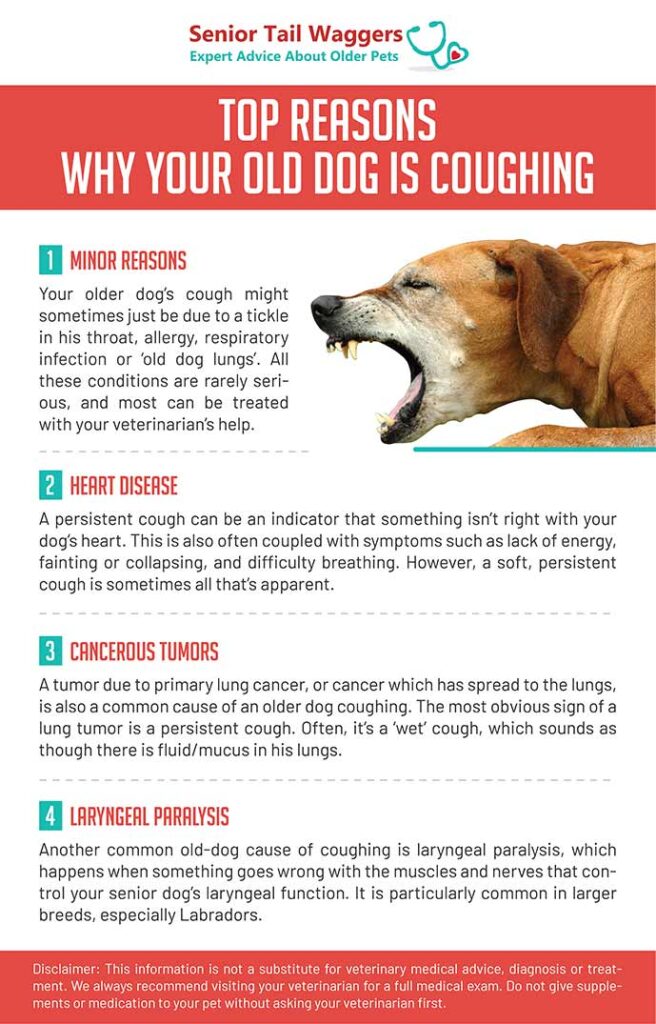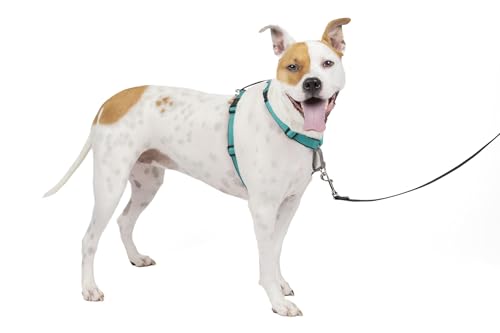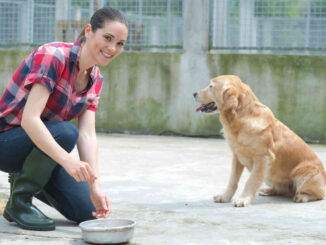
This article was updated on October 15th, 2022
Before we look at possible home remedies to help your senior coughing dog, it is important to rule out some medical reasons for coughing. If your dog has a heart condition, he needs to see his veterinarian as a cough could indicate a worsening of the heart problem.
Also, if your dog is sick – has a fever, has a pus like nasal discharge, won’t eat, then he should be seen by his veterinarian. Those signs could indicate a serious underlying problem like pneumonia.
For the dog who is coughing but feels basically OK (which is most dogs with kennel cough or canine cough syndrome), there are some things you can do at home to help make him comfortable. With exceptions such as above, a cough is not a reason for an immediate emergency clinic trip.
When your dog coughs, the linings of his respiratory tract get irritated. The more he coughs, the more irritation. This can become a vicious cycle. Your goal is to break that cycle.
8 Home Remedies to Help Your Coughing Dog at Home
I’ve written about home remedies for dog coughing in my book “Dog Owner’s Home Veterinary Handbook”, and have summarized my recommendations below.
- Start with Simple Home Care
Start with some basic supportive care. If your dog has discharge from his eyes or his nose, use a warm compress to soften the crusts and clean gently. A dab of vitamin E (puncture a capsule with a pin and squeeze out a drop) can help with a sore nose.
Artificial tears drops or ointment can be safely applied to his eyes.
If anyone in the family smokes, this is the ideal time to reinforce a “no smoking in the house” rule. If your area is under any polluted air warnings (manmade pollution or from wildfires) minimize the time your dog is outdoors. Ideally put HEPA filters in the main rooms he hangs out in.
2. Use a Humidifier or Steam
Excessively dry air can cause coughing in dogs. If you have a humidifier, encourage your dog to rest in that area. Be sure your humidifier is clean and not moldy.
“A winter cough may be caused by something as simple as dry air. Try using a humidifier to see if it helps.“
Dr. Debra Eldredge
Author of the “Dog Owner’s Veterinary Handbook”
Here is a user commenting on how a humidifier helped their coughing dog:

No humidifier? When you go to shower, have your dog come into the bathroom. The warm, moist air can help just like a humidifier.
If you have a small portable humidifier, you can set it up next to your dog’s crate. Then cover the crate with a sheet to keep moisture in. Plain water is best.
3. Use a Teaspoon of Honey
People also often reach for honey when they have a cough. A teaspoon of honey in a cup of warm water may ease a short throat. This is not recommended for puppies (think about infant cautions) or for dogs with diabetes as it can interfere with glucose regulation.
Below are other comments from dog owners who have successfully used honey to help their coughing dogs:

Below is a great story from a dog owner who used honey as an effective short-term measure to help their dog:

4. Consider Limiting Physical Activity in Cold Weather
Very cold, dry air outside can stimulate coughing as well as dry air inside. Senior dogs don’t handle extreme cold well. Keep walks short and limited. Many senior dogs appreciate pee pads (like for a puppy) or a litterbox (yes, real dogs use them as well as cats 😊 ) indoors. This is not the time to start an exercise program for your dog. In most cases, exercise will cause more coughing.
Encourage quiet activity like chew toys and food puzzles with low calorie choices. Scentwork is a fun activity in the house.
5. Use a Non-Restrictive Harness Instead of a Collar
Be sure that you use a non-restrictive harness for walks. Do not walk him on a collar. The pressure on the trachea can stimulate more coughing. This is especially true for dogs with short muzzles (the brachycephalic breeds like French Bulldogs and Pugs). This dog harness works well:
- STOPS PULLING: Safely controls light to moderate pulling by resting across your dog’s chest instead of his throat
6. Give your Dog a Quiet Place to Rest
Coughing can be exhausting. Make sure your dog has a quiet place to rest. Give him an escape from active children or other pets in the household who might try to stimulate him. A crate in a quiet room can really help to speed healing.
7. Increase Hydration
It is important to support your dog’s hydration when he has a cough. A dry cough can be more painful than a moist one. Plus, coughing can increase his normal hydration needs. Water is top of the list for fluids. Very cold water may cause some coughing, so stick to room temperature or slightly warm.
If your dog is not drinking well, consider trying some low or no sodium bouillon, adding some juice from tuna canned in water or other meat juice flavoring (plain) to his water. You can also see the Cummings Veterinarian School’s recommendations for using broth, and our own article on “Senior Tail Waggers” about using bone broth.
Respiratory illnesses may interfere with scenting so you want something with an odor to encourage more fluid consumption. Adding some liquid to his meals can also increase hydration.
Also consider chicken soup: While there are many jokes about “Grandma’s chicken soup”, chicken soup can help hydrate your dog. Don’t use commercial soups. They are processed and often have high levels of sodium (especially bad if your dog does have a heart condition).
Instead, make your own by putting a whole chicken or pieces of chicken in your slow cooker. No spices. Let that cook all day in some water. Shred the meat. A bowl of that, served warm to increase enticing odors, offered separately or poured over some food, is a big hit with the canine crew.
8. Over the Counter Cough Medication
Dextromethorphan is a common ingredient in human OTC cough medications such as Robitussin. It can be helpful for some dogs short term. This is an “off label” medication so you should check with your veterinarian about use in your individual dog. It is not recommended for dogs with liver problems or for dogs on a number of medications, including tramadol, amitraz containing collars or selegiline.
****ALWAYS check ANY human medication for the ingredient xylitol. This can be fatal to dogs! You should always check with your veterinarian before you give your dog any new medication or home remedy****
- One 20 count bottle of Robitussin Adult Long-Acting CoughGels
The home care remedies mentioned above are all supportive care ideas to help with symptoms. None of them actually address the cause of the cough, with the possible exception of adding humidity.
When Home Remedies are NOT Enough
There are also times when home care is not going to be enough. Putting off a veterinary visit could endanger your dog if he has a serious underlying cause for the cough. At a minimum, you need a phone call into your veterinarian if your dog has these symptoms or known conditions:
- Open mouth breathing along with a cough
- Pale or bluish mucous membranes (look at his gum color)
- History of a heart condition, including a previous heartworm infection
- History of cancer
- Difficulty breathing – including labored breathing and very rapid respiratory rate
- Fever
- Pus type discharge from his nose
- “Feeling sick” – lethargic, not wanting to eat or play
- Collapse
How Will a Veterinarian Help a Coughing Dog?
If your dog has a serious cough, your veterinarian will do a number of procedures. First, is a complete physical examination. Depending on the clinical signs, this may include:
- A thorough auscultation – listening to all areas of his chest with a stethoscope.
- Radiographs (x-rays) are generally recommended so that the lungs can be carefully evaluated.
- Bloodwork may be suggested to rule out things like heartworm, anemia, and bacterial or viral infections.
- A culture and sensitivity may be sent out to determine the best antibiotic to use for a bacterial infection.
Treatment will vary with findings and may also include the following:
- Your dog may need to be hospitalized and placed in an oxygen cage.
- Bronchodilators may be prescribed to open up his airways for better air flow.
- Antibiotics may be needed to combat infection.
- A cough suppressant may be needed to give your dog and his respiratory tract a break from the coughing.
Learn More About Dog Coughing:
 Dog Coughing: Our Vets Explain What to Do [8 Home Remedies] - Your dog has started to cough repeatedly - it's usually a sign that your dog is suffering from a serious… [...]
Dog Coughing: Our Vets Explain What to Do [8 Home Remedies] - Your dog has started to cough repeatedly - it's usually a sign that your dog is suffering from a serious… [...] Senior Dog Coughing? 2 Vets Share How to Help Your Old Dog - If your old/senior dog is coughing or gagging, we can help you understand why and what you can do about… [...]
Senior Dog Coughing? 2 Vets Share How to Help Your Old Dog - If your old/senior dog is coughing or gagging, we can help you understand why and what you can do about… [...] Dog Coughing Up Blood: A Veterinarian Shares What to Do - There have been a few times when a dog has come into my clinic coughing up blood. If you ever… [...]
Dog Coughing Up Blood: A Veterinarian Shares What to Do - There have been a few times when a dog has come into my clinic coughing up blood. If you ever… [...] Can a Dog Die From Kennel Cough? - Key highlights from Dr. Chyrle Bonk: - Kennel cough is typically mild, mostly a nuisance. - Rarely, kennel cough can… [...]
Can a Dog Die From Kennel Cough? - Key highlights from Dr. Chyrle Bonk: - Kennel cough is typically mild, mostly a nuisance. - Rarely, kennel cough can… [...] Help: My Dog is Coughing in the Morning [Vet Advice] - As a veterinarian, one thing that I see often is dogs that are coughing. The time of day that your… [...]
Help: My Dog is Coughing in the Morning [Vet Advice] - As a veterinarian, one thing that I see often is dogs that are coughing. The time of day that your… [...] Dog Hairball Cough: What Dog Owners Need to Know - When it comes to hairballs, cats are most known for coughing up these wet chunks of fur. But dogs can… [...]
Dog Hairball Cough: What Dog Owners Need to Know - When it comes to hairballs, cats are most known for coughing up these wet chunks of fur. But dogs can… [...]
Disclaimer: This website's content is not a substitute for veterinary care. Always consult with your veterinarian for healthcare decisions. Read More.







Be the first to comment